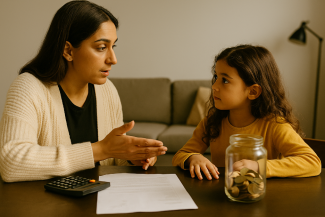
How to Raise Financially Confident Kids in a World That Never Stops Selling
The other day, my six-year-old hit me with a question I wasn’t quite expecting:
“Mom, why isn’t our house completely new?”
Now, I could’ve laughed it off, told her it’s because we have a mortgage and a budget and life is expensive, but instead, I paused.
I told her, “We could finish all the renovations at once if we wanted to. But that would mean putting travel on hold for a while.”
She didn’t even flinch.
“I’d rather go on the airplane.”
Honestly? Same.
That moment stuck with me. Not just because it was funny, but because it echoed exactly what I’d just shared in our podcast on Money Dysmorphia: how early money beliefs form, and how much kids absorb before they even understand what money does.
With kids today constantly being fed messages about what to wear, what to buy, how to live, they absorb those expectations long before they have their own debit card.
As both a parent and a financial advisor, I hear the same question repeatedly from clients raising young kids:
“How are you teaching them to be financially responsible?”
Here’s where I encourage most families to start:
Start With a Simple Framework
You don’t need anything elaborate to teach kids about money. Start with three categories:
- Spend: something for now
- Save: something for later
- Give: something to help someone else
This introduces the idea that money has purpose, and that we get to define what that purpose looks like.
Let Real-Life Choices Do the Teaching
That house conversation? It was about priorities. About values. My daughter made a choice between two “good” things, and she understood that saying yes to one meant waiting on the other.
That’s the kind of decision-making we want to normalize. Not just for our kids, but for ourselves.
Whether it’s a toy, a trendy water bottle, or a big vacation, we can help kids pause and ask:
Is this worth it to me?
What might I need to give up?
That’s financial literacy. More than math, it’s mindset.
Talk About Influence, Not Just Spending
Our kids are growing up in a world where “what to want” is fed to them constantly. They’re absorbing plenty through peers, social media, shows, ads, etc.
So, when your child starts asking for something that’s suddenly a must-have, try asking:
- “What do you like about it?”
- “Would you want it if no one else, had it?”
These questions encourage reflection and awareness. And honestly? That same habit serves us adults just as much
Give Them Room to Practice (and Mess Up a Little)
In the podcast, I shared a story about giving my daughter a set budget at the store. Watching her weigh price tags and decide what fit was eye-opening for both of us.
That moment wasn’t about money but about boundaries, independence, and decision-making.
When we let kids manage small amounts of money, they experience real tradeoffs.
Sometimes they get it right. Sometimes they don’t. That’s the point. It sticks.
The Bottom Line
Money isn’t the goal. What money makes possible is.
It’s a tool that lets us rest, travel, give, choose, and connect.
And when we talk to our kids about money, we’re not just teaching them to budget. We’re helping them build clarity about what matters.
These tools shape them, and they shape us too. The more we pause, reflect, and choose with intention, the more we grow right alongside them.
It doesn’t have to be perfect. Just start. Stay open. And don’t be surprised when your six-year-old teaches you something.

